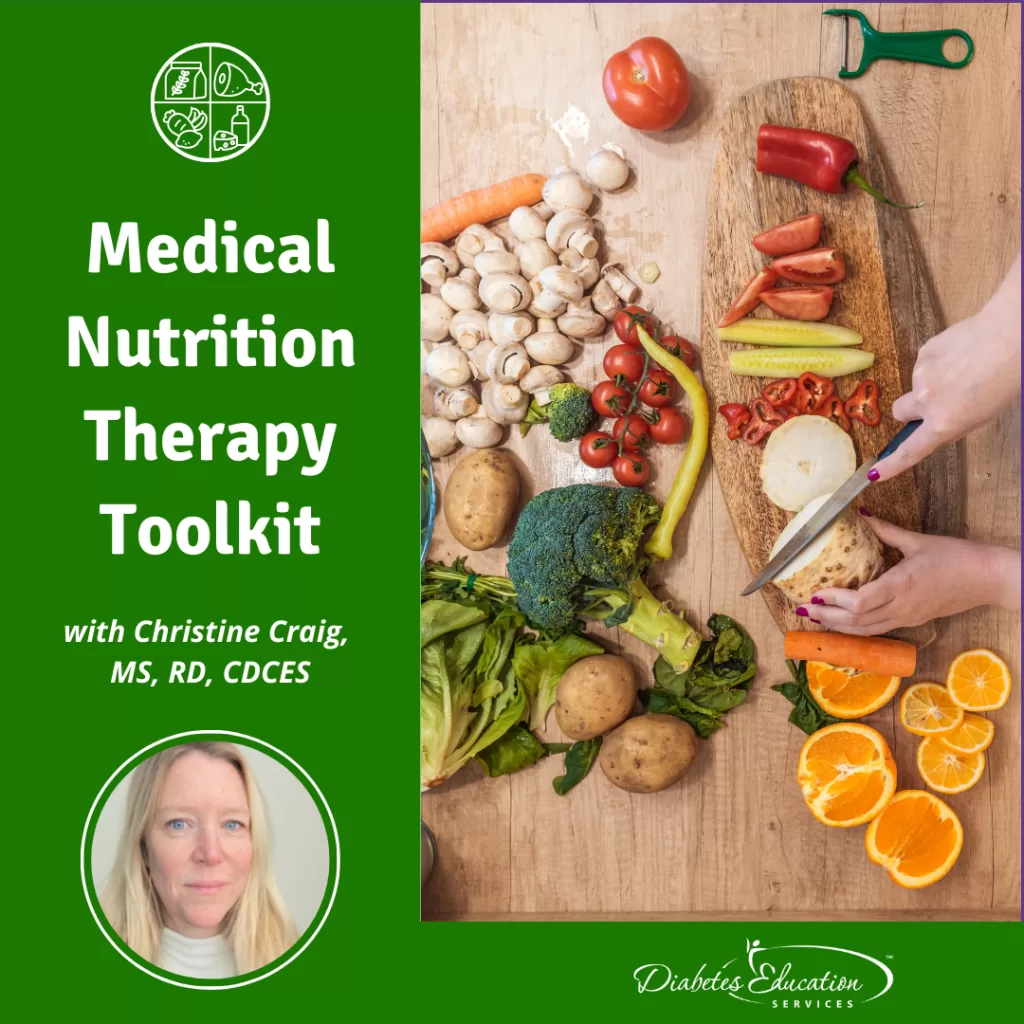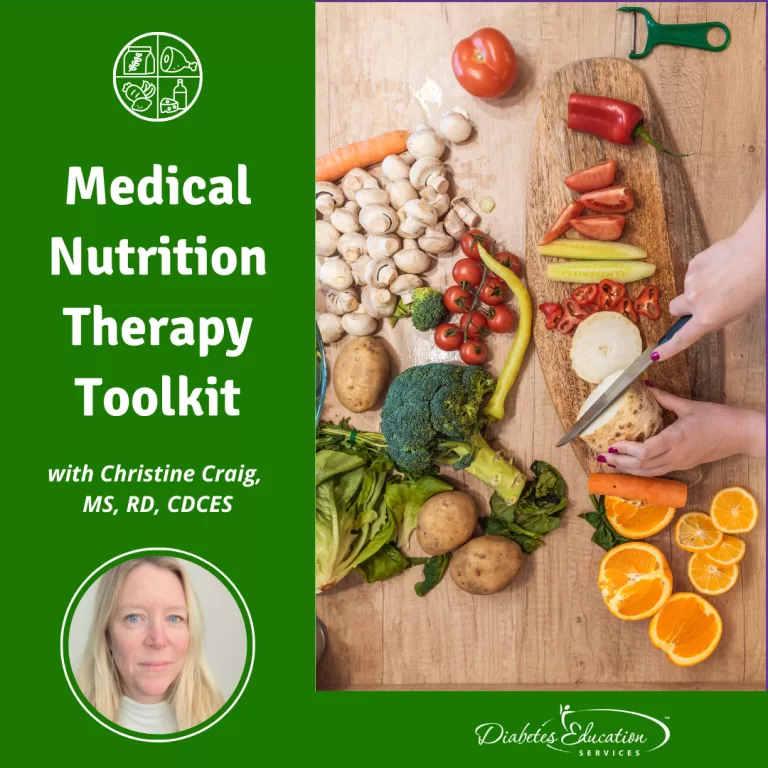
Ready to get certified?
Free CDCES Coach App

Subscribe
eNewsletter
Download
Free Med Pocket Cards
Question of the Week | Best Hormone Therapy Approach for T2D?

Which statement accurately reflects current guidelines on hormone therapy (HT) in postmenopausal individuals with type 2 diabetes?
- Oral estrogen is preferred over transdermal forms due to better metabolic outcomes.
- Progesterone levels increase post-menopause, exacerbating insulin resistance.
- Transdermal estrogen may improve insulin sensitivity and carries a lower thrombotic risk compared to oral estrogen.
- Testosterone levels rise during menopause, leading to increased central adiposity.
Want to learn more about this question?
Join us live on August 27th for our
Level 5: Hot Flashes & Hyperglycemia: What Clinicians Need to Know

Join us live on August 27th, 2025, at 11:30 am PST to watch our brand new webinar, Hot Flashes & Hyperglycemia: What Clinicians Need to Know by Dr. Jill Schramm, DNP, FNP-C, BC-ADM, CDCES
The intersection of menopause and diabetes is often underrecognized in clinical care, yet people with diabetes in menopausal transition face unique metabolic, hormonal, and lifestyle changes that can significantly impact glycemic control. This session explores the physiological shifts of menopause, the implications for insulin resistance, and evidence-based strategies for individualized care. Attendees will leave with practical guidance on hormone therapy, lifestyle management, and education tools to improve outcomes for people with diabetes navigating both diabetes and the menopausal transition.
All hours earned count toward your CDCES Accreditation Information
Sign up for Diabetes Blog Bytes – we post weekly Blog Bytes that are informative and FREE! Every week we post one exam practice Question of the Week and Rationale of the Week. Sign up below!
Recent Blog Bytes
- How Not Winning Motivated Me to Write A Book
- Question of the Week | What Not to Say to Overwhelmed Individual
- February 2026 eNews
- Rationale of the Week | Best Response for Facilitating Positive Health Behavior Change?
- Question of the Week | Which Feature Most Strongly Supports a Diagnosis of HHS Rather Than DKA?
The use of DES products does not guarantee the successful passage of the certification exam. CBDCE and ADCES do not endorse any preparatory or review materials for the CDCES or BC-ADM exams, except for those published by CBDCE & ADCES.
Question of the Week | T1D and Artificial Sweeteners: Safe Limits

Sam is a 28-year-old with type 1 diabetes who reports drinking six diet sodas per day,
believing they help manage blood glucose. Sam asks if this is safe or if they should
reduce consumption. What would be an appropriate response based on the 2025 ADA
Standards of Care?
- You should avoid diet soda and all non-nutritive sweeteners because they’re linked to cancer and heart disease.
- Diet sodas are completely safe, so there’s no reason to change your intake.
- While non-nutritive sweeteners are FDA-approved, let’s discuss your current intake concerns, and whether unsweetened beverages may be a better option.
- Switch to natural sugars like honey or agave syrup since they are healthier than artificial sweeteners.
Want to learn more about this question?

This four-hour course highlights the latest ADA evidence-based nutrition and exercise guidelines. Our nutrition expert, Christine Craig, MS, RD, CDCES, provides strategies to apply this important information to individuals living with diabetes. She includes in-depth discussions on different approaches to person-centered meal planning and the benefits and limitations of each. If you are getting ready to take your diabetes certification exam, this course provides essential content for exam success.
Topics addressed by Christine Craig, MS, RD, CDCES
-Medical Nutrition Therapy Updates and Critical Content
-Describe person-centered nutrition issues based on assessment and clinic data.
-Explore national guidelines for medical nutrition therapy and how to individualize interventions from a person-centered perspective.
-State how to customize nutritional approaches in people living with complications of diabetes.
-How to Eat by the Numbers and Meal Planning Approaches
-Describe the impact of micro and macronutrients on health.
-List different meal planning approaches and the pros and cons of each.
-Describe how to help people with diabetes to read labels and be thoughtful consumers.
-Keeping Well Through Activity and Nutrition
-Describe activity benefits, precautions, and recommendations
Fee: $69.00/ 4.25 CEs
All hours earned count toward your CDCES Accreditation Information
Sign up for Diabetes Blog Bytes – we post weekly Blog Bytes that are informative and FREE! Every week we post one exam practice Question of the Week and Rationale of the Week. Sign up below!
Recent Blog Bytes
- How Not Winning Motivated Me to Write A Book
- Question of the Week | What Not to Say to Overwhelmed Individual
- February 2026 eNews
- Rationale of the Week | Best Response for Facilitating Positive Health Behavior Change?
- Question of the Week | Which Feature Most Strongly Supports a Diagnosis of HHS Rather Than DKA?
The use of DES products does not guarantee the successful passage of the certification exam. CBDCE and ADCES do not endorse any preparatory or review materials for the CDCES or BC-ADM exams, except for those published by CBDCE & ADCES.
Question of the Week | CGM Timing After Type 1 Diagnosis

JT, a 17-year-old recently hospitalized with a new diagnosis of type 1 diabetes, is using Multiple Daily Injections (MDI) therapy. JT uses fingerstick blood glucose monitoring but wants to move to a CGM. JT’s mother wants to know how long fingerstick monitoring must be used before a CGM can be started. According to the ADA 2025 Standards of Care, when can a CGM be initiated after a type 1 diabetes diagnosis?
- CGM is to be initiated when an individual with type 1 diabetes does not meet glycemic targets.
- CGM is to be initiated only when an individual with type 1 diabetes is started on continuous subcutaneous insulin infusion (CSII) therapy.
- CGM can be initiated when an individual with type 1 diabetes is ready and able, and the individual or caregiver has been educated on its use, even at diagnosis.
- CGM is to be initiated when an individual with type 1 diabetes is over the age of 18.
Tech Data Toolkit – Recorded and Ready to Watch!

Gain confidence in interpreting the Glucose Profile Report (AGP) & CGM data using a
person-centered approach
As diabetes technology is becoming commonplace in our practice, figuring out how to make sense of all the data can seem overwhelming. Join Diana Issacs and Coach Beverly for a truly unique learning experience.
Topics include:
- Review CGM key metrics and individualize time in-range goals
- Learn how to recognize patterns with the AGP report efficiently
- Utilize the AGP report as a discussion guide when meeting with a person with diabetes
- Recommend lifestyle and medication adjustments based on CGM data
- Strategies to recognize the expertise of the individual and collaborate on person-centered problem solving.
All hours earned count toward your CDCES Accreditation Information
Sign up for Diabetes Blog Bytes – we post weekly Blog Bytes that are informative and FREE! Every week we post one exam practice Question of the Week and Rationale of the Week. Sign up below!
Recent Blog Bytes
- How Not Winning Motivated Me to Write A Book
- Question of the Week | What Not to Say to Overwhelmed Individual
- February 2026 eNews
- Rationale of the Week | Best Response for Facilitating Positive Health Behavior Change?
- Question of the Week | Which Feature Most Strongly Supports a Diagnosis of HHS Rather Than DKA?
The use of DES products does not guarantee the successful passage of the certification exam. CBDCE and ADCES do not endorse any preparatory or review materials for the CDCES or BC-ADM exams, except for those published by CBDCE & ADCES.
Question of the Week | Insulin Pump Inquiry for Rising A1C on MDI?

C.K. is a 55-year-old elementary school teacher diagnosed with type 1 diabetes ten years ago and is managing glycemic control with multiple daily injections (MDI) and a CGM. You are seeing C.K. for diabetes education due to an increasing hemoglobin A1c from 7.0% to 9.9%. During the appointment, C.K. reports missing mealtime doses due to being “too busy to get all that stuff out” at both work and home. C.K. notes that a friend from church has an insulin pump and asks if an insulin pump would help improve their A1c.
As the diabetes care and education specialist, what factors do you need to assess before determining if C.K. is ready for insulin pump therapy?
- C.K. is not ready for an insulin pump because of the frequently missed mealtime doses of rapid-acting insulin.
- C.K. is a candidate for an insulin pump because this person dislikes their current MDI therapy regimen, making no further evaluation or assessment necessary.
- C.K. may be a appropriate candidate, but it is essential to assess knowledge of diabetes self-management, willingness to learn pump skills, and ability to troubleshoot the insulin pump.
- C.K. is not a candidate for an insulin pump because the A1C is above target.
Live in San Diego
DiabetesEd Training Seminar
Join us live October 22nd – 23rd, 2025!
30+ CEs with Expanded Accreditation!


Join our expert team for engaging, interactive sessions that bring the ADA Standards of Care to life—covering medications, behavior change, technology, and more. Ideal for CDCES or BC-ADM exam prep, this course also includes a 4-hour Virtual Medical Nutrition Therapy Toolkit and bonus content that also meets CDCES renewal requirements.
Program Objectives:
Upon completion of this activity, participants should be able to:
- Describe the current ADA Standards for diagnosis, goals, and person-centered diabetes management across the lifespan.
- Demonstrate insulin pattern management and dosing strategies in clinical scenarios.
- Implement timely screening and risk reduction strategies for microvascular and cardiovascular complications.
- Incorporate behavior change techniques and medical nutrition therapy to support people with diabetes self-management and lifestyle adjustment.
Expert Faculty:

Diana Isaacs, PharmD, BCPS, BCACP, CDCES, BC-ADM, FADCES, FCCPCES

Beverly Thomassian, RN, MPH, CDCES, BC-ADM
Faculty Bios & Disclosures
Our expert team transforms complex diabetes science into clear, practical insights—keeping it real, engaging, and fun!
Program Faculty Disclosures:
Partners for Advancing Clinical Education (Partners) requires every individual in a position to control educational content to disclose all financial relationships with ineligible companies that have occurred within the past 24 months. Ineligible companies are organizations whose primary business is producing, marketing, selling, re-selling, or distributing healthcare products used by or on patients.
All relevant financial relationships for anyone with the ability to control the content of this educational activity are listed below and have been mitigated according to Partners policies. Others involved in the planning of this activity have no relevant financial relationships.
Faculy Bios & Disclosures:
 Coach Beverly Thomassian RN, MPH, CDCES, BC-ADM – CEO of DiabetesEd Services
Coach Beverly Thomassian RN, MPH, CDCES, BC-ADM – CEO of DiabetesEd ServicesDisclosures:
Beverly Thomassian has no financial disclosures
Bio:
 Diana Isaacs, PharmD, BCPS, BCACP, CDCES, BC-ADM, FADCES, FCCPCES
Diana Isaacs, PharmD, BCPS, BCACP, CDCES, BC-ADM, FADCES, FCCPCES
Disclosures:
Dr. Diana Isaacs has the following relevant financial relationships:
- Consultant, advisor, and speaker for Abbot Labratories, Dexcom, Medtronic, Insulet, Lilly, Cequr, Sanofi, and Undermyfork
- Board member at Association for Diabetes Care and Education Specialists
Bio:
Diana Isaacs was awarded 2020 ADCES Diabetes Educator of the Year for her educational platform promoting the use of CGM for people with diabetes and other innovations. She serves in leadership roles for several pharmacies and diabetes organizations. She has numerous diabetes publications and research projects with a focus on medications, CGM and diabetes technology.
For the past three year, Dr. Isaacs has served as a contributing author for the 2023 ADA Standards of Care.
As the Program Coordinator and clinical pharmacist specialist in the Cleveland Clinic Diabetes Center, Dr. Isaacs brings a wealth of clinical knowledge combined with extensive research and speaking experience to this program.
Expanded Accreditation
Activity Start and End Date: 10/22/25 – 10/23/2025
Estimated time to complete the activity: 15 hours and 30 minutes
_____________________________________
Jointly provided by Partners for Advancing Clinical Education and Diabetes Education Services
![]()
![]()
Joint Accreditation Statement:
 In support of improving patient care, this activity has been planned and implemented by Partners for Advancing Clinical Education (Partners) and Diabetes Education Services. Partners is jointly accredited by the Accreditation Council for Continuing Medical Education (ACCME), the Accreditation Council for Pharmacy Education (ACPE), and the American Nurses Credentialing Center (ANCC), to provide continuing education for the healthcare team.
In support of improving patient care, this activity has been planned and implemented by Partners for Advancing Clinical Education (Partners) and Diabetes Education Services. Partners is jointly accredited by the Accreditation Council for Continuing Medical Education (ACCME), the Accreditation Council for Pharmacy Education (ACPE), and the American Nurses Credentialing Center (ANCC), to provide continuing education for the healthcare team.
Physician Continuing Education:
Partners designates this enduring material for a maximum of 15.50 AMA PRA Category 1 Credit(s)™. Physicians should claim only the credit commensurate with the extent of their participation in the activity.
Nursing Continuing Professional Development:
The maximum number of hours awarded for this Nursing Continuing Professional Development activity is 15.50 contact hours.
Pharmacy Continuing Education:
Partners designates this continuing education activity for 15.50 contact hour(s) (1.550 CEUs) of the Accreditation Council for Pharmacy Education.
(Universal Activity Number – JA4008073-9999-25-206-L01-P)
Type of Activity: Application
For Pharmacists: Upon successfully completing the activity evaluation form, transcript information will be sent to the NABP CPE Monitor Service within 4 weeks.
Dietitian Continuing Education:
This program offers 15.50 CPEUs for dietitians.
Interprofessional Continuing Education:
![]() This activity was planned by and for the healthcare team, and learners will receive 15.50 Interprofessional Continuing Education (IPCE) credit for learning and change.
This activity was planned by and for the healthcare team, and learners will receive 15.50 Interprofessional Continuing Education (IPCE) credit for learning and change.
For additional information about the accreditation of this activity, please visit https://partnersed.com.
The use of DES products does not guarantee the successful passage of the certification exam. CBDCE and ADCES do not endorse any preparatory or review materials for the CDCES or BC-ADM exams, except for those published by CBDCE & ADCES.
Question of the Week | DKA Prevention After T1D Diagnosis?

A 10-year-old child with newly diagnosed type 1 diabetes is being discharged from the hospital. Which of the following components is most critical to include in the initial outpatient diabetes management plan to reduce the risk of diabetic ketoacidosis (DKA) and hospital readmission?
- Initiate basal insulin therapy and MNT instruction, with follow-up in two weeks.
- Provide basic carbohydrate counting and bolus insulin instruction with a follow-up appointment within 30 days.
- Establish follow up with a specialist within a week and provide actions to take in case of glucose emergencies.
- Prescribe continuous glucose monitoring (CGM) and glucagon rescue medication and ask family to schedule a follow-up appointment after the sensor is delivered and set up.
Want to learn more about this question?
Enroll in our From Tots To Teens
Level 2 Course!

This course includes updated goals & guidelines for children living with type 1 or type 2 diabetes. This course discusses the special issues diabetes educators need to be aware of when working with children with diabetes & their families. We discuss the clinical presentation of diabetes, goals of care, & normal growth & development through the early years through adolescence. Strategies to prevent acute & long-term complications are included with an emphasis on positive coping for families & children with diabetes.
Objectives:
- Discuss the goals of care for Type 1 and Type 2 Kids with Diabetes.
- State Strategies to prevent acute and chronic complications.
- Discuss the importance of positive psychosocial adjustment & resources.
Question of the Week | ADA 2025: Which MNT Statement Is False?

According to the 2025 ADA Standards of Care, which of the following statements about medical nutrition therapy (MNT) for adults with type 2 diabetes is NOT TRUE?
- A low-carbohydrate diet eating pattern of <26% of calories from carbohydrates can lead to a reduction in A1c.
- Nutrition therapy provided by a registered dietitian nutritionist (RDN) can result in A1C reductions of up to 0.5%.
- Individualized nutrition therapy begins at diagnosis.
- A Mediterranean eating pattern can reduce the risk of major cardiovascular disease events.
Want to learn more about this question?

This four-hour course highlights the latest ADA evidence-based nutrition and exercise guidelines. Our nutrition expert, Christine Craig, MS, RD, CDCES, provides strategies to apply this important information to individuals living with diabetes. She includes in-depth discussions on different approaches to person-centered meal planning and the benefits and limitations of each. If you are getting ready to take your diabetes certification exam, this course provides essential content for exam success.
Topics addressed by Christine Craig, MS, RD, CDCES
-Medical Nutrition Therapy Updates and Critical Content
-Describe person-centered nutrition issues based on assessment and clinic data.
-Explore national guidelines for medical nutrition therapy and how to individualize interventions from a person-centered perspective.
-State how to customize nutritional approaches in people living with complications of diabetes.
-How to Eat by the Numbers and Meal Planning Approaches
-Describe the impact of micro and macronutrients on health.
-List different meal planning approaches and the pros and cons of each.
-Describe how to help people with diabetes to read labels and be thoughtful consumers.
-Keeping Well Through Activity and Nutrition
-Describe activity benefits, precautions, and recommendations
Fee: $69.00/ 4.25 CEs
All hours earned count toward your CDCES Accreditation Information
Sign up for Diabetes Blog Bytes – we post weekly Blog Bytes that are informative and FREE! Every week we post one exam practice Question of the Week and Rationale of the Week. Sign up below!
Recent Blog Bytes
- How Not Winning Motivated Me to Write A Book
- Question of the Week | What Not to Say to Overwhelmed Individual
- February 2026 eNews
- Rationale of the Week | Best Response for Facilitating Positive Health Behavior Change?
- Question of the Week | Which Feature Most Strongly Supports a Diagnosis of HHS Rather Than DKA?
The use of DES products does not guarantee the successful passage of the certification exam. CBDCE and ADCES do not endorse any preparatory or review materials for the CDCES or BC-ADM exams, except for those published by CBDCE & ADCES.
Question of the Week | How much do you know about Coach Bev?

Each month, we’ll test your knowledge with fun questions about Coach Beverly! She’s been a leader in diabetes education for over 25 years—but how did her journey begin, and what shaped her philosophy?
Quiz Time!
Which early job taught Coach Beverly the value of loving your work and providing excellent service?
- Working as a monitor technician at a community hospital.
- Volunteering at a convalescent hospital after school.
- Showing up at Ying’s Kitchen Chinese Food Restaurant.
- Babysitting a family of six kids during the summer.
Question of the Week | Decoding AGP Report – Test Your Knowledge

AJ asks you why their blood glucose levels are “all over the place”. When you look at the AGP, you notice the coefficient of variation is 26%. What is the best response?
- Even though your coefficient of variation is above target, we can work to bring that down.
- It seems like you are making a big effort keep your glucose in target range.
- Given your glucose fluctuations, we may need to intensify your medication regimen.
- With some small changes in lifestyle activities, I am sure you can make improvements.
Want to learn more about this question?
Join us live on May 8th & May 15th
Tech Data Toolkit!

Gain confidence in interpreting Glucose Profile Report (AGP) & CGM data using a person-centered approach! Earn 4.0 CEs
If you are preparing for certification exams or want to up your game using CGM data to improve outcomes, this course is for you.
We still have room available for the May 8th kick off date.
Save 20% – Use code Bloom20 at checkout!
Join us live for this unique learning experience.
Session 1 – May 8th
with Beverly Thomassian at 11:30am to 12:30pm PST
Session 2 – May 15th
with Dr. Diana Isaacs at 11:30am to 2:30pm PST
Gain confidence in interpreting Glucose Profile Report (AGP) & CGM data using a person-centered approach.
As diabetes technology is becoming commonplace in our practice, figuring out how to make sense of all the data can seem overwhelming. Join Diana Issacs and Coach Beverly for a truly unique learning experience.
Dr. Isaacs has a special knack for breaking down the essential elements of the Ambulatory Glucose Profile (AGP) report to provide participants with a clear road map for data interpretation. She includes many sample practice cases utilizing CGM data for various types of people with diabetes including type 2 and people with type 1 not on pumps.
Coach Beverly will build on Dr. Isaacs’ presentation and switch the focus to the person living with diabetes. Using a case study approach, she will provide strategies to integrate the AGP with person-centered care that empowers individuals to experience increased confidence in their diabetes self-management.
By attending this interactive workshop, participants will become more confident in interpreting the AGP and continuous glucose monitor (CGM) data and determining needed medication and lifestyle adjustments with a person-centered approach.
Topics include:
Review CGM key metrics and individualize time in-range goals
Learn how to recognize patterns with the AGP report efficiently
Utilize the AGP report as a discussion guide when meeting with a person with diabetes
Recommend lifestyle and medication adjustments based on CGM data
Strategies to recognize the expertise of the individual and collaborate on person-centered problem solving.
All hours earned count toward your CDCES Accreditation Information
Sign up for Diabetes Blog Bytes – we post weekly Blog Bytes that are informative and FREE! Every week we post one exam practice Question of the Week and Rationale of the Week. Sign up below!
Recent Blog Bytes
- How Not Winning Motivated Me to Write A Book
- Question of the Week | What Not to Say to Overwhelmed Individual
- February 2026 eNews
- Rationale of the Week | Best Response for Facilitating Positive Health Behavior Change?
- Question of the Week | Which Feature Most Strongly Supports a Diagnosis of HHS Rather Than DKA?
The use of DES products does not guarantee the successful passage of the certification exam. CBDCE and ADCES do not endorse any preparatory or review materials for the CDCES or BC-ADM exams, except for those published by CBDCE & ADCES.






